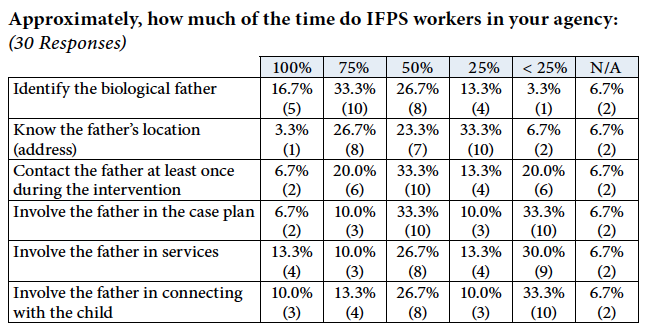In 2002, the National Family Preservation Network (NFPN) embarked on a voyage in uncharted waters to a research demonstration project on father involvement. The project was funded with a $450,000 grant from the Stuart Foundation and was unique in that:
- It was the first known research study to determine not only how child welfare social workers viewed fathers but how to motivate these workers to involve more fathers in the lives of their children.
- The study included the first-of-its-kind fatherhood training manual with onsite training provided to the social workers.
- Following training and other motivational assistance, the social workers demonstrated increases in measures of identifying, locating, contacting, and involving fathers in case planning and placement of children.
- A research paper of the study was published in a peer-reviewed journal.
- As an outgrowth of the study, NFPN produced basic and advanced curricula for training front-line practitioners who work with fathers.
- There is no known replica of this demonstration project.
While programs for practitioners have been relatively scarce, hundreds of programs have been developed for fathers. These programs are varied and may include marriage and relationship strengthening as well as employment, child support, parenting, financial, and other types of assistance. Although tremendous gains have been made in the number and type of programs for fathers, these programs share a weakness with programs for practitioners: little evaluation or development of evidence-based practice.
A study conducted by the Center for Research on Fathers, Children and Family Well-Being, found that only 15% of federal grantees in the most recent fatherhood grant cycle were selected for participation in evaluation. The Center goes on to say, “The fatherhood field passionately believes that . . . serving fathers ultimately improves child well-being. The field therefore has a responsibility to back up those beliefs by investing in researcher-practitioner collaborations to go through all of the stages involved in developing evidence-based practice.”
How can we build evidence-based father involvement programs?
To the greatest extent possible, all of us who are passionate about helping fathers need to use evidence-based curricula and programs. And we need to insist that all programs include a meaningful evaluation that goes well beyond counting numbers and conducting pre/post satisfaction and knowledge surveys. The target to aim for in evaluation is measuring the well-being of children.
Here are some resources that could move the field closer to the target:
- The federal Administration for Children and Families (ACF) is soliciting applications for the establishment of a Responsible Fatherhood Research Network: http://1.usa.gov/1bWTRdY
- The National Responsible Fatherhood Clearinghouse has research-based tips for practitioners:
http://1.usa.gov/1dQ63vb
- The Clearinghouse has released The Responsible Fatherhood Toolkit: Resources from the Field that provides assistance with launching and sustaining successful fatherhood programs: (PDF download)
http://1.usa.gov/15ZHQBS
- Read the full report on the current status of father involvement and evidence-based practice: (PDF download)
http://bit.ly/132G51y
- Supporting Father Involvement offers evidence-based curricula for fatherhood programs:
http://bit.ly/12HsbD9
- Learn more about resources and training for practitioners:
http://bit.ly/1b8AYXs
_______________
Posted by Priscilla Martens, NFPN Executive Director

